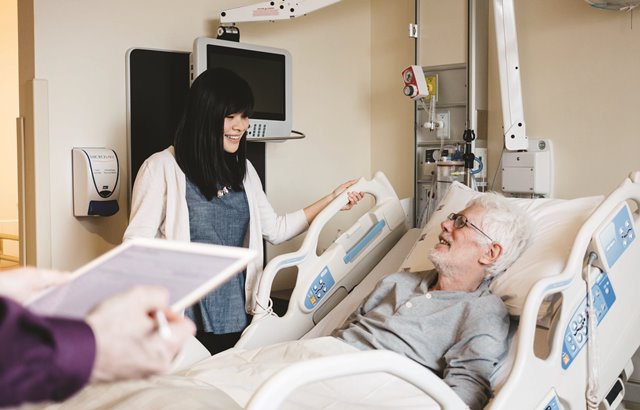By Michael Oreskovich
By the end of this decade, a staggering one in 10 Canadians is expected to have diabetes. Such high prevalence comes at a great personal cost; if the disease isn’t well-managed, it causes organ damage, blindness and even limb loss. The financial toll diabetes takes on the healthcare system is also severe. In 2012, $12.2 billion was spent in Canada to treat the disease, an amount that will rise annually as diagnoses climb. It’s crucial to find innovative solutions for managing the disease both effectively and sustainably.
One way Runnymede Healthcare Centre meets this challenge is by leveraging the unique expertise of its clinical registered dietitians (RDs). As certified diabetes educators (CDEs), the hospital’s clinical RDs are ideally positioned to facilitate coordination among interprofessional team members to manage the disease. The result of this collaboration is improved quality of life for patients, less reliance on medication and shorter hospital stays.
Diabetes is a chronic disorder in which sugar accumulates in the blood instead of being converted to energy, either because the body doesn’t produce insulin or can’t use the insulin it makes. “About one-third of our patients are diabetic, so controlling the disease is a high priority,” said Sharleen Ahmed, Runnymede’s Vice President of Strategy, Quality and Clinical Programs. “Patient-centred therapeutic diets contribute to the maintenance of stable blood sugar levels, which helps patients benefit as much as possible from rehabilitation so they can return home from hospital sooner.”
The scope of practice of clinical RDs goes a step beyond at Runnymede because of the team members’ CDE designations. The CDE credential is earned through education that broadens knowledge of diabetes care across multiple disciplines, including pharmaceutical therapies. This advanced expertise makes the clinical RDs ideal point-people for overseeing management of the disease at the hospital.
The skills and knowledge gained from CDE training enable Runnymede’s clinical RDs to prepare and recommend diabetes treatment plans that ‘connect the dots’ across disciplines. Ultimately these plans are finalized by the hospital’s physicians, but the clinical RDs’ unique perspectives play a significant role in facilitating collaboration within the interprofessional team and place a strong emphasis on proper nutrition.
To illustrate this, Janna Kwong, professional practice leader for Runnymede’s clinical RDs, points to a patient the team recently treated. “He was getting daily insulin injections to manage his diabetes for years, but after examining his dietary habits here, we collaborated with the interprofessional team and found ways to adjust what he ate so he could take an oral medication instead for stabilizing his blood sugar.” The positive impact of this change on the patient’s experience was profound. “Afterward, every time I’d see him, he’d always stop me to say how happy he was about not having to take daily insulin injections anymore.”
The CDE designation also enhances the clinical RDs’ role as educators for patients and their families. By teaching self-management techniques, the team members help patients gain control of their disease. “We increase patients’ awareness of how their food choices impact their disease,” said Kwong. “We give them the education and tools they need so they’re able to continue with the good dietary habits we start them on here at Runnymede.” This support enhances patients’ independence and increases safety after discharge.
Harnessing clinical RDs’ specialized skills as CDEs is a leading-edge solution Runnymede uses for managing diabetes. It enhances sustainability in the face of rising costs by keeping medication use to safe minimums where appropriate and increasing the efficiency of clinical staff through improved collaboration. Ahmed, however, is quick to say the hospital’s efforts are about patient-centred care, first and foremost. “The team’s approach enhances quality of life and safety, and contributes to patients achieving their rehabilitation goals sooner so they can resume their lives,” she said. “The education our clinical RDs provide to patients ensure healthy dietary habits are continued after discharge, so they can safely manage the disease on their own and be as independent as possible.”
Michael Oreskovich is a Communications Specialist at Runnymede Healthcare Centre.


